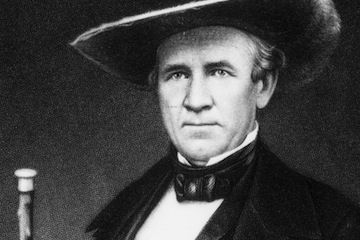Sam Houston -- First Elected President of Texas
The area now constituting the United States had two Presidential elections in 1836. In one, Martin Van Buren was elected President of the United States. In the other, Sam Houston defeated Stephen F. Austin to become the first elected President of Texas. Houston entered the contest only 11 days before the voting, but his record in the Texas Revolution won him almost 80% of the vote.
Life before Texas was rarely dull for Sam Houston and contained numerous vacillations of political and personal fortune. For a time considered the protégé of Andrew Jackson, he served as Governor of Tennessee in the 1820s. However, his wife left him and slandered his character, even as Houston took issue with Jackson over the Cherokee question. Houston spoke fluent Cherokee and was sympathetic to their plight. Yet he was still attacked by anti-Jacksonians, purely for political purposes. Since Jackson himself enjoyed great popularity, opponents turned to tearing down his perceived underlings and favorites. Houston attacked one of these opponents, a Congressman, with a cane on Pennsylvania Avenue. This led to much legal trouble and public disgrace, and Houston chose to flee for Texas.
In the rough-and-tumble of the frontier, beyond the borders of the United States, Houston enjoyed a resurgence. Ability and leadership counted for much more than past reputation in the sparsely populated Texas, particularly after an independence movement was launched against Mexico. From the day he arrived in Texas, Sam Houston was an independence supporter, and on March 2, 1836, he affixed his signature to Texas's Declaration of Independence.
Houston was commander of the Texas army, as much as it could be called one given its small size. Under his leadership, however, a few hundred men were able to crush the Mexican forces at San Jacinto, and Houston became a national hero of Texas.
With independence assured, an election was scheduled for September 5, 1836. Stephen F. Austin was the frontrunner, but Sam Houston entered the race 11 days before the end. Houston advocated the annexation of Texas by the United States. Some people at that time wished for Texas to remain independent (such as Houston's successor, Mirabeau Lamar), and to manage its own affairs and particularly its policy with Mexico. Some even envisioned the Republic of Texas expanding into the American West under its own auspices. Others maintained that Texas would be stronger within the United States. As Texas was an avowed slaveholding state-to-be, Southerners in the U.S. were generally eager to bring it into the union, and Northerners less so.
Another political issue was the relations between Texas and the American Indian tribes. Houston's sympathies towards the American Indians put him out of step with the majority in Texas, who would eventually move to expel the tribes. Regardless of the settlers' opinions on the issues, they idolized the person of Sam Houston as many had idolized George Washington in an earlier era, and this popularity more than carried the day in 1836. Houston won the election with 79.4% of the votes cast.
Texas would eventually join the United States, but not until 1845. Houston was active in Texas politics until the start of the Civil War, at which point he was forced out of office, as Governor, for opposing secession. He died a private citizen in 1863, sitting out the conflict that had ruptured the nation.
